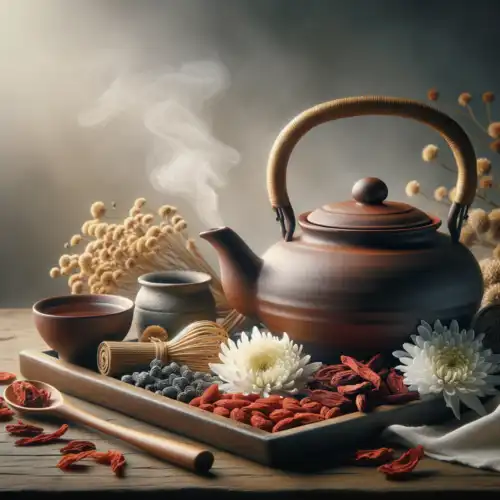Guide to Herbal Remedies
Herbal remedies have been used for centuries across various cultures. They utilize plants and their extracts to treat ailments and improve health. In today's world, many people are rediscovering these natural options, seeking alternatives to conventional medicine.
One of the most exciting aspects is that herbal remedies can be both *effective* and *gentle*. They often come with fewer side effects compared to pharmaceutical drugs. Additionally, incorporating herbs into your daily routine can support overall wellness!
Types of Herbal Remedies
There are numerous types of herbal remedies, each suited for different needs. Some common categories include:
- Teas: Infusions made from leaves, flowers, or roots.
- Tinctures: Concentrated liquid extracts using alcohol or vinegar.
- Ointments: Salves made with herbs to apply topically.
- Capsules: Dried herbs ground into powder and contained in pill form.
These various forms make it easier for individuals to find the right method for their needs. For instance, if you prefer sipping on a warm beverage, herbal teas might be your best bet!
Common Herbal Remedies and Their Benefits
Here are some popular herbs and the health benefits they bring:
- Chamomile: Known for its calming effects, it helps with sleep and digestion.
- Ginger: Great for nausea and digestive issues, and it has anti-inflammatory properties.
- Echinacea: Often used to boost the immune system and fight off colds.
- Peppermint: Helpful for headaches and digestive discomfort.
Incorporating these herbs into your routine can greatly enhance your health. They can be used alone or in combination for better results!
How to Prepare Herbal Remedies
Preparing herbal remedies can be a fun and rewarding process. To get started, you’ll need to gather your materials, such as dried or fresh herbs, water, and containers. Always ensure that herbs are sourced from reputable suppliers to maintain *quality* and *safety*.
For instance, making a simple herbal tea involves steeping the herbs in hot water for a certain amount of time. This allows the beneficial compounds to infuse into the liquid. Always remember to strain the herbs before drinking to enjoy a smooth experience!
Safety Considerations
While herbal remedies can be beneficial, it’s essential to use them wisely. Always consult with a healthcare provider before starting any new herbal treatment, especially if you have existing health conditions or take other medications. Some herbs can interact with medications, leading to undesirable effects.
Additionally, it’s crucial to be aware of potential allergies. If you’re trying a new herb, start with a small amount to assess your body’s reaction. This careful approach can help you enjoy the benefits without unnecessary risks. Learn more at: https://www.dailyqiritual.com/
Storing Your Herbal Remedies
Proper storage of herbal remedies is vital to preserving their potency. Store herbs in a cool, dark place, away from direct sunlight and moisture. Glass jars or airtight containers are excellent options for this purpose.
It’s also a good idea to label your containers with the herb name and date of preparation. This practice helps you track freshness and ensures you’re using remedies at their peak effectiveness!
Exploring Herbal Remedies in Daily Life
Integrating herbal remedies into your daily life can be simple and enjoyable. You can start by swapping out your regular tea for herbal alternatives or adding herbs to your cooking. Many culinary herbs like basil and rosemary also have health benefits!
Consider keeping a journal of your experiences with different herbs. Document how they make you feel and any changes you notice in your health. This can be a helpful resource for future reference and can also enhance your *understanding* of herbal benefits!
Conclusion
Herbal remedies offer a *natural* and often gentle approach to health. With a bit of knowledge and preparation, anyone can explore the world of herbs. Remember to use them responsibly, and consult with a healthcare provider when necessary!
So, why not dive in and start your journey with herbal remedies today? You might just discover new ways to enhance your well-being and enjoy the wonders of nature!
Frequently Asked Questions (FAQs) about Herbal Remedies
1. What are herbal remedies?
Herbal remedies are treatments that utilize plants and their extracts to improve health and treat ailments, often with fewer side effects than pharmaceutical drugs.
2. What types of herbal remedies are commonly used?
Common types of herbal remedies include teas, tinctures, ointments, and capsules, each suited for different needs and preferences.
3. What are some popular herbs and their benefits?
Popular herbs include chamomile for calming effects, ginger for nausea, echinacea for immune support, and peppermint for headaches.
4. How do you prepare herbal remedies?
Preparing herbal remedies involves gathering materials like dried or fresh herbs, then infusing them in water or using other methods as appropriate, ensuring quality and safety.
5. Are there any safety considerations with herbal remedies?
Yes, it’s important to consult with a healthcare provider before starting new herbal treatments, especially if you have health conditions or are on medication, as some herbs can interact with drugs.
6. How should you store herbal remedies?
Store herbal remedies in a cool, dark place using glass jars or airtight containers, and label them with the herb name and date of preparation to track freshness.
7. How can I integrate herbal remedies into my daily life?
You can integrate herbal remedies by swapping regular tea for herbal alternatives, adding herbs to cooking, and keeping a journal to track your experiences and health changes.
Follow Us
Tumblr | Weebly | Twitter | Gravatar | Disqus | Google Sites | Youtube | About.me
Comments
Post a Comment